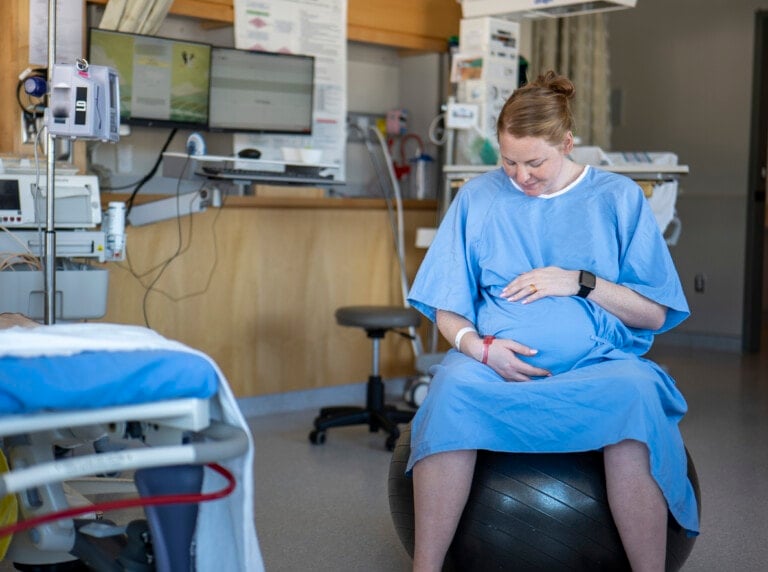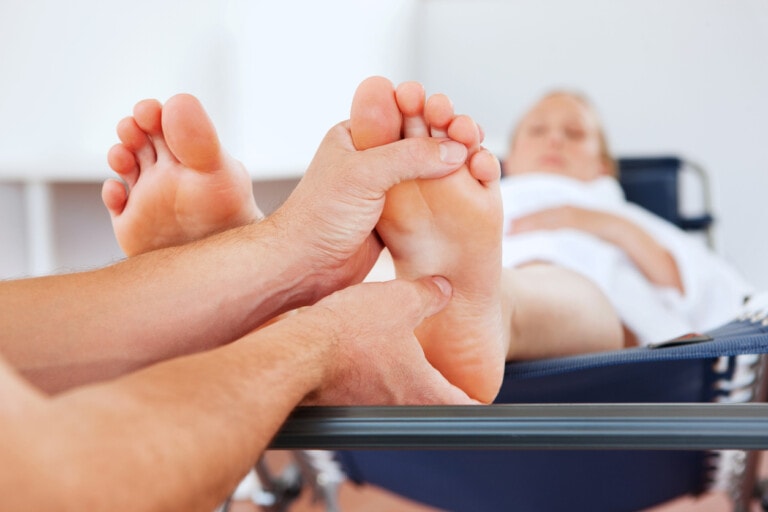Throughout pregnancy, there tends to be a common misconception about birth — that labor prep should be physically focused. Believe it or not, birth is more mental than physical!
Mindset plays a huge role in your birth experience. Imagine you were training for a marathon. You wouldn’t just practice running over and over again while neglecting your nutrition, breathing, or conditioning. Well, childbirth is pretty similar!
Birth Is More Mental Than Physical
You may have created a birth plan and gone on your hospital tour, but are you mentally ready to give birth? I’m sure many moms who give birth unmedicated will agree that their ability to be mentally strong throughout their birth experience is what helped them through the process. The reason is that the more an expecting woman mentally prepares for the childbirth process, the better she can focus and calm her mind.3 She understands what’s normal, what to expect, how to advocate for herself, what not to do, and what her options are along the way.1 If she’s more mentally prepared for her birthing day, she can be more likely to have a favorable experience.4
However, labor and birth are unique and unpredictable events for everyone, and true medical emergencies do happen. No matter how much a woman prepares, babies will determine how they want to be born. However, if a mom has an uncomplicated pregnancy and labor, she may decrease her chances for unnecessary medical interventions. The more she can relax and be calm, the more her body can relax and open.4,5 This can enable her labor to progress and potentially go faster. However, if she fights against her contractions, is unaware of what to expect, and is fearful of the pain of labor, this may lead to a longer labor and a less favorable birth experience.6
Fear-Tension-Pain Cycle
In the 1920s, Grantly Dick-Read, a British obstetrician, described what’s now known as the “Fear-Tension-Pain” cycle. He suggested that fear causes women to become tenser and that having more tension increases their pain. In turn, the increased pain she feels causes her to become more fearful, and the cycle continues and strengthens.2
Dick-Read suggested stopping this cycle by:2
- Reducing fear: Educating women about what to expect during childbirth
- Reducing tension: Promoting relaxation, which then reduces the pain

How To Mentally Prepare for Labor
By understanding the childbirth process and practicing the ability to relax your mind and body, you can have a more enjoyable birth. But how can you better prepare mentally for labor? Below, you’ll find some practical ways that can help:
1. Read Daily Positive and Empowering Affirmations
Using positive affirmations throughout pregnancy and birth is a great way to train your mind to trust that your body can give birth!7,8 Some moms even benefit from reading positive birth stories from other moms. It gives them hope, empowerment, and the confidence they need to have that “I CAN DO THIS” feeling.9 If you’ve never used affirmations, you can easily create your own by writing some on index cards. Read ours for ideas (Birth Affirmations and Pregnancy Affirmations), and check out our podcast episode with more pregnancy affirmations. Or you can order premade and beautifully crafted cards like these.

2. Keep an Open Discussion With Your Partner or Doctor
Openly discuss with your partner and doctor or midwife what type of support you need or would like to have during labor. Every person in the delivery room (or at home, for those having a home birth) must be a positive support person for you.
If gentle touch and massages help calm you down, let your partner know! Ask if they can be by your side to gently massage your back or shoulders throughout contractions. If having a doctor deliver your baby makes you feel more at ease, express this to your medical provider in advance. Having these little details figured out long before your due date can provide the emotional reassurance you need. It helps to know you’ll be loved and supported through birth in the exact way that you need.
3. Incorporate Forms of Meditation Into Your Daily Routine
Meditation can be helpful when dealing with painful contractions during birth.5 If you’ve never practiced meditating before, there are some apps and online courses that do an excellent job of teaching these types of techniques:
- Headspace: This app has guided meditation practices to calm your mind and reduce stress in just a few minutes each day.
- InsightTimer: From meditation, yoga, and sleep to live options, InsightTimer is another wonderful app to help you feel calm and relaxed throughout stressful situations.
- Hypnobirthing or Hypnobabies: These birthing methods use self-hypnosis and relaxation techniques to help a woman feel physically, mentally, and spiritually prepared for childbirth. Their scripts and meditations reduce her awareness of fear, anxiety, and pain during childbirth.
4. Take a Childbirth Class and Practice Breathing Techniques To Stay Calm and Minimize Stress
Lamaze is one of the most common childbirth courses, and breathing techniques can help mothers cope with labor pains and stressors.2,3,5,10 Though there are plenty of options out there, the idea is that a controlled breath can help you relax and decrease the perception of pain.11 If you’ve signed up for a birth class, it should cover comfort and breathing techniques. If not, look into a different birth class or, more specifically, a Lamaze class. You can ask your doctor’s office to find out if your hospital offers one of these classes for you.
5. Be Physically Prepared for Birth, Too!
Being physically prepared for birth can also help you mentally prepare.3 Understanding your body’s needs, signals, and stressors can be beneficial to labor. You’ll be able to trust your own body’s instincts. For instance, some moms find lying down during contractions uncomfortable. Some mamas may feel like getting medication will help them. Others may find that a simple change in position can help them manage the pain. The point is that you know when your body is feeling stressed out. You should fully trust in your decisions to help it.
Giving birth requires patience, strength, and focus beyond your physical limitations. This is why birth is more mental than physical, making it important to prepare your mind and learn what to expect during childbirth. So, how will you prepare?































